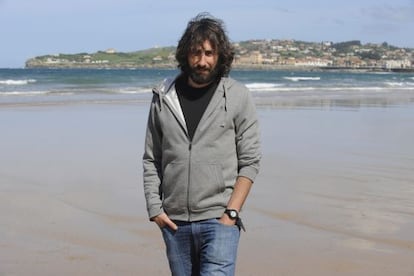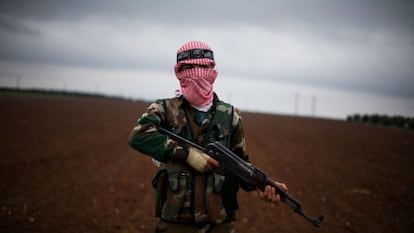“What terrifies me is seeing friends standing in the unemployment line”
Spanish journalist was held prisoner in Libya


One fine day, Manuel Varela de Seijas Brabo decided to use the money he'd been spending on a university education in Madrid to learn from travel instead. He was born in Zaragoza in 1981, but his life revolves around Asturias: he was raised in Gijón and studied photography in Oviedo. On April 5, 2011, he was captured by a pro-Gaddafi group in Libya, and spent six weeks in captivity. But he carried on with his work. His efforts during the conflict in Syria have just earned him a Pulitzer Prize.
Question. You're in the news again, as you were when those Gaddafi supporters captured you. How are you dealing with all the attention?
Answer. Not well at all, but the difference is that when you get back from Libya, you're in bad shape and you don't care about people. What's important is your own self and your mental health. Now you can't get away from it, though. Now you can't be the jerk who sends everyone away, even if that's what you really feel like doing. It's stressful, I need to go back to being anonymous as soon as possible.
Q. Do you think that people consider you to be reckless?

A. When I went back to Libya, the agency I was working for asked me whether I was sure I was doing the right thing. I replied: "If you want the pictures, you can take them, and if you don't, then I'll find another place that will." I had to find another place.
Q. So are you reckless, then?
A. I am not. A guy who's doing his job is not reckless. A Japanese guy who goes [to Syria] on vacation or a kid who does an internship there, those people are reckless. There can also be isolated reckless actions. The road to the newsworthy event is not an easy one: you have to cross streets full of snipers, get past checkpoints, wade through rivers, go over barbed wire fences, and cross borders illegally. That's the way this profession works - getting the story entails a certain amount of sacrifice. Nobody can guarantee with 100-percent certainty that you're going to get past the obstacle.
Q. On occasions you must've thought: "Dammit, Manu...".
A. Sometimes I think: "If my mother ever saw me doing this!" The miner who has to squeeze into a seam where there's hardly any room with his jackhammer - is he being reckless? No, he has to go in there and get the coal out. Well, same here.
Q. Have you changed after seeing war close up?
He was captured by a pro-Gaddafi group in Libya and spent six weeks in captivity
A. After Libya, especially after Libya, you learn to value things. Like going for a walk with your old man and having the kind of conversation you haven't had for a long time, or going hiking with your sister, or to Berlin to see your brother - just because you feel like it, the world be damned. Your priorities become clearer, because I have less time to be with the people I love. I have no time to be a jerk to others - even if I am - or for others to be jerks to me. I don't have time to beat about the bush.
Q. And fear is something else?
A. Normally you wake up with the gunfire at 6am, wash your face with cold water, spend a few hours having tea and cigarettes because nothing is happening, or else you went God knows where because there was some bombing going on, but it turns out it was just a gas canister. And then you go from that to coming here and going to the market and having the neighbor corner you into a conversation... Sometimes I think of it like a bipolar disorder: there's the person you are there and there's the person you are here. I find it harder coming back from there than going there from here.
Q. Why?
A. Over there it's progressive and over here it's sudden. I find it easier to get used to things going badly than to things going well.
Q. But fear changes a person...
A. I won't tell you I don't get scared over there, because I do, but I adapt well. Over here I've always found it hard to adapt - I don't know what to do about it. I've never been afraid of being mugged. If it happens, it happens. But one of the things that fills me with terror is seeing my sister out of a job, and she's going to run out of unemployment checks and what is she going to do after that? Or seeing friends who've been in the same situation for over a year. That really messes with my head, because it makes me think: "I'm going to end up like this too." Never mind the Pulitzer, or having been in this war or that. But then if that happens, I'll grab my suitcase and get the hell out of here. I am terrified of people who are sad, listless and resigned. Over on the other side, people are suffering, but with their heads held high, goddammit.
Q. Did you want the Pulitzer?
A. If anyone asks me if I want it, I'll say "Well, okay then." But I don't want it to be a gift - I want to deserve it. You wonder about it, you dream about it...
Q. Are you afraid it might change you?
Spain is not worth getting pissed off about, but it does make you sad"
A. I just want all this to-do to be over. It's really over the top. I want to go on vacation with my woman and then to Cairo to work. The job I got the Pulitzer for is already over and done with.
Q. You work for a foreign media outlet. Was that an option or an obligation?
A. An obligation. I was lucky enough to meet the head of AP in Cairo.
Q. Do you get pissed off with Spain?
A. It's not worth getting pissed off about, but it does make you sad because there are lots of enthusiastic professionals out there. Our level of photojournalism is among the highest in the world. But then people decide that it's better to invest in something dumb like a pressure cooker exploding in Barakaldo.
Q. What do you see when you look at Gijón after weeks of war?
A. Peace, calm. The safety of knowing that you're going to put your foot forward without stepping on a mine; I'm not going to get into trouble, unless I end up clambering over cars, which wouldn't be the first time, either. To know that it's 8.30pm and I can go off with my friends. Coming back here is like returning to the womb. Nothing scares you, nothing pulls you out of your routine.
Tu suscripción se está usando en otro dispositivo
¿Quieres añadir otro usuario a tu suscripción?
Si continúas leyendo en este dispositivo, no se podrá leer en el otro.
FlechaTu suscripción se está usando en otro dispositivo y solo puedes acceder a EL PAÍS desde un dispositivo a la vez.
Si quieres compartir tu cuenta, cambia tu suscripción a la modalidad Premium, así podrás añadir otro usuario. Cada uno accederá con su propia cuenta de email, lo que os permitirá personalizar vuestra experiencia en EL PAÍS.
¿Tienes una suscripción de empresa? Accede aquí para contratar más cuentas.
En el caso de no saber quién está usando tu cuenta, te recomendamos cambiar tu contraseña aquí.
Si decides continuar compartiendo tu cuenta, este mensaje se mostrará en tu dispositivo y en el de la otra persona que está usando tu cuenta de forma indefinida, afectando a tu experiencia de lectura. Puedes consultar aquí los términos y condiciones de la suscripción digital.








































